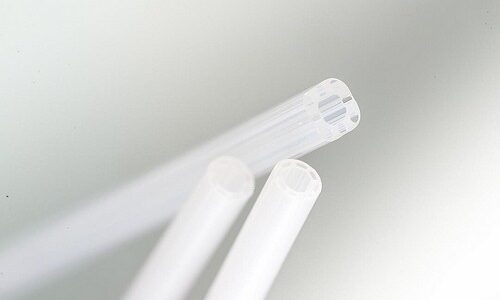Fluoropolymers have excellent, almost universal chemical resistance. They can be used both at high and very low temperatures (-260 to +260°C). They also possess outstanding resistance to weathering (UV-stability).
Due to the low coefficient of friction, they are often used as sliding materials or as corresponding additives in other high-performance plastics.
TECAFLON PVDF (PVDF)
Polyvinylidenefluoride (PVDF) – TECAFLON PVDF – is an opaque, semi-crystalline, thermoplastic fluoropolymer. PVDF is characterized by excellent chemical stability, without having the disadvantages of low-mechanical values and/or processing difficulties which can be experienced with other fluoroplastics.
- low density compared to other fluoropolymers
good mechanical strength compared to other fluoropolymers
high permanent operating temperature (140°C)
practically no moisture absorption
good dimensional stability
high chemical resistance
good resistance to hydrolysis
weather-proof
radiation resistant
good electrical insulator
high abrasion resistance
TECAFLON PTFE natural (PTFE)
Polytetrafluoroethylene (PTFE) – TECAFLON PTFE natural – is a semi-crystalline fluoropolymer with an unusually high chemical and thermal resistance (-200 to +260°C, temporarily up to 300°C). In addition, this thermoplastic material has excellent sliding properties, a non-stick surface and the best insulating properties. This is in contrast, however, to low mechanical strength and a high specific gravity, compared to other plastics. In order to improve the mechanical properties, PTFE can be used as a compound reinforced with additives such as glass fibre, carbon or bronze. Due to its structure, this material is formed into semi-finished products using a compression processes and machined afterwards with cutting/machining tools.
- extremely high chemical resistance
very good temperature resistance (-200-+260°C, temporarily up to 300°C)
very low coefficient of friction (static friction = sliding friction)
extremely low surface tension (practically no materials stick to PTFE -> difficult to adhere to or weld)
high coefficient of thermal expansion
relatively low strength/rigidity
low dielectric constant
non-combustible




